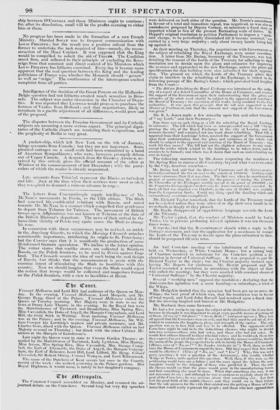Zbe Metropolis.
The Common Council assembled on Monday, and resumed the ad- journed debate on the Corn-laws. Several long but very dry speeches were delivered on both sides of the question. Mr. Norris's meadow; in favour of a total and immediate repeal, was negatived, as was also an amendment proposed by Deputy Corney, to substitute a fixed duty on imported wheat in lieu of the present fluctuating scale of duties. 'Mr. Heppers original resolution to petition Parliament to impose a " mode. rate charge, to he periodically diminished till it become nominal," was carried by a very large majority ; only about twenty hands being held up against it.
At their meeting on Thursday, the negotiations with Government en the subject of rebuilding the Royal Exchange, were under considera- tion. A letter from Mr. Baring, Secretary of the Treasury, was read, detailing the reasons of the Lords of the Treasury for adhering to their resolution not to decide upon the plans and estimates for improvins the avenues and approaches to the new Exchange, unless the plans an specifications for that building were also submitted for their approbas tion. The ground on which the Lords of the Treasury place their claim to interfere in the rebuilding of' the Exchange, is stated in the following passage of Mr. Baring's letter ; which provoked loud laughter from the Court- " The Bill Or Rebuilding the Royal Exchange was introduced on the maks rity of a report of a Select Committee of' the I louse of Commons, and received the support of the Government upon their understanding that the pfuns and estimates of the whole work should be subject to the approval and sanction of the Board of' Treasury ; the execut ion of the works being confided to the City authorities. it was upon this pri,o tl«d the was support, 1 in kit Houses of Parliament, and that the consent and support of the (kw-minima was given." Mr. R. L. Jones made a few remarks upon this and other blunders of " may Lords" and their Secretary— Now there was no such thing as a bill for rebtriMag time Royal Exclinag:i
in existence. The bill which had been so misrepresented was a hill " for in. proving the site of the Royal Exchange in the city of London, and the avenues thereto," and contained not one word about mbuilding. That IAD, it appeared from their Lordships' letter, received the support of the Government upon their understanding that the plans and estimates of the whole work should lie subject to the approval mid sanction of the Board of Treasury : what work did they mean ? The bill had not the slightest reference to any work, except the works widt'h related to the buildings to be taken down, and thy avenues to be tbrmed; and where was it shown that such an understanding was ever in being?
Time following statement by Mr. Jones respecting the readiness of Mr. Spring Rice to augment the Coal-duty, beyond what was even asked by the City, deserves attention— Mr. Baring had said that the House of Commons and the Gorernment lactating continued the tax 015 (20:3 rim the extent of I 75.1.1)00/. Nothing conk be more erroneous than 11:at assyrtion. The limit tt hen he mentioned the project of eolith:win, time ioittl-iluty for the purpi:-, it. rising the Lin,ntalf, the Chancellor /f theEchegttr mil% mimed Si, MI' grant of :210,1100/. ;ti the Oman ii he h;tring object,if hi awl ii is ss, i. la fin II t Wits I ,Therill d. In- deed, all that was regain:a vas I 12,t IL, as the sum of 3tI,1104.1/. was availalik from I I m CUIVI Vitt 1011 11111G, Could any thing i:qual the shuttling which such
ex traordi mmtry at ions exemplified?
Mr. Richard Taylor renmrked, that the Lords of the Treasury would not be sotislied unless they were allowed to dip their own hands in the trust-funds as deeply as they pleased. Mr. Baylis disapproved of opprobrious language towards the Lord: of the Treasury. . Mr. Taylor replied, that time conduct of Ministers would he bad in Tories, but in persons professing Liberal opinions it was ten thousand times worse,
It leas decided that the embrancer should write a reply to Mr. Baring's statement, aud tbat time application fur it nuoulatnus to compel the Lords of the Treasury to decide upon the plans submitted to thew, should be postponed till next term.


























 Previous page
Previous page